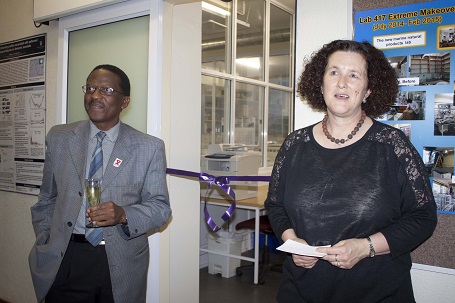
The newly refurbished Marine Natural Products Research Laboratory, located within the Department of Biochemistry and Microbiology in the Biological Sciences Building, was officially launched on Tuesday 17 March. The opening was attended by Vice-Chancellor Dr Mabizela, the Deputy Vice-Chancellor Research and Development, Dr Clayton and The Executive Director: Infrastructure and Operations, Dr L’Ange. Dr
Mabizela officially opened the newly renovated Marine Natural Products Research Laboratory.
The new laboratory will house the research group of Professor Rosemary Dorrington, who holds the Rhodes University SA Research Chair in Marine Natural Products. The laboratory has been completely re-furbished and provides the best environment for cutting edge molecular biology research. The Marine Natural Products Research laboratory will support multi-disciplinary research across the drug discovery pipeline, ranging from marine biology and the discovery of new marine biodiversity of the South African coast, to microbial ecology, microbial genomics to natural products chemistry and screening for biological activity. The focus of the research is to explore the pharmaceutical potential of small molecules produced by indigenous marine organisms such as sponges and sea squirts and their associated microbes. These molecules, known as secondary metabolites often have potent biological activity that can be harnessed for the development of new anti-cancer, anti-malaria, anti-TB and anti-viral drugs.
Including microbiologists, chemists, biochemists and marine biologists, the natural products research programme draws on the expertise of researchers the three most research productive academic departments at Rhodes University (Biochemistry and Microbiology, Chemistry, Zoology and Entomology). The programme has also developed strong collaborative ties with local research institutions, the South African Institute for Aquatic Biodiversity (SAIAB) and the South African Environmental Observation Network (SAEON).
